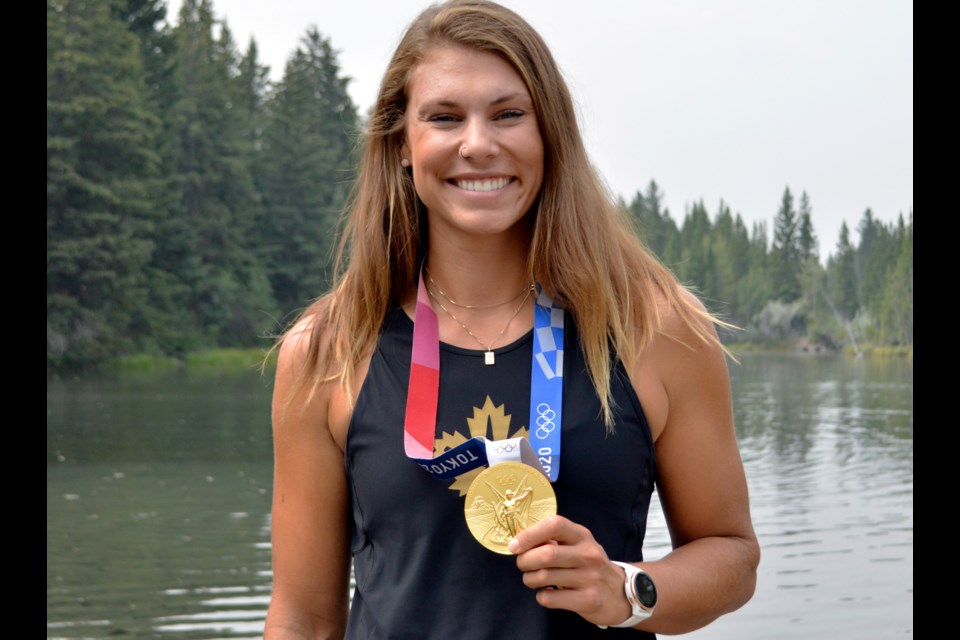CANMORE – When an ugly upper-body injury threatened Kasia Gruchalla-Wesierski's spot on the women's eight Olympic rowing team, she received a very tight timeline to not only heal from it, but to be back rowing.
With her arm in a sling post-surgery due to a broken collarbone, the 30-year-old from Calgary was six weeks away from the big dance and given a three-and-a-half week deadline to comeback – and that was all the time needed for the newly crowned Olympic champion.
Gruchalla-Wesierski and her teammates led Friday's (July 29) race from beginning to end, claiming gold for the first time in 29 years.
Though, the powerful rower reflected on how things could have been much different for her.
“I almost didn’t race at the Olympics,” said Gruchalla-Wesierski on Sunday (Aug. 1) in Canmore, a mountain town she refers to as her second home.
“Luckily, my body just really responded to the surgery, but it was like, I don’t even know if most of my high performance team really thought I could do it. They gave me a shot because I begged for it and convinced them that I needed it. They treat me really well, so they gave me the shot, but it was really a tight timeline. I had to be rowing within three-and-a-half weeks of getting surgery at full pressure.”
Caused by a freak road biking accident on Vancouver Island six weeks before the Olympics, it had almost been a disastrous situation for the first-time Olympian, noting backup Rebecca Zimmerman was on standby.
At first, Gruchalla-Wesierski thought her shoulder was dislocated, but later found out her right collarbone broke and was in need of surgery that required a metal plate, screws and 56 stitches to repair.
Within one week post-surgery, time was ticking away quickly for the determined Canuck, who was back on the spin bike and riding up to four hours a day.
After fighting hard for a spot on the women's eight, she had come too far and so close to wait until 2024.
The former alpine ski racer and coach at Sunshine Village and Banff Alpine Racers started rowing in 2014. In four years, she was training with the national team in Victoria, B.C.
However, her journey to make the national team was a tough path, in which she dedicated herself to the craft to be great enough to wear the Maple Leaf on the world stage.
Within three-and-a-half weeks of her biking injury, the oarswoman was rowing again – and ready for Tokyo.
"Our mission for our team was to redefine excellence," she said. "It wasn't just let's win a gold, it was more than that. We wanted to make a statement that Canadian rowing isn't over and to be a part of that is so special because it makes it way bigger than you just winning a gold medal. It actually gives purpose to your mission."
Gruchalla-Wesierski and teammates Lisa Roman, Christine Roper, Andrea Proske, Susanne Grainger, Madison Mailey, Sydney Payne, Avalon Wasteneys and coxswain Kristen Kit advanced to the finals to challenge the top five nations of Australia, China, Romania, the United States – winners of the last four Olympic gold medals – and the 2019 world champions from New Zealand.
Canada got off to a roaring start on Friday and led at every marker in the 2,000-metre sprint. Gruchalla-Wesierski, who sat two seat or second from the front, notes she’ll push as hard as possible at the beginning to get her team in the mix.
Out on the Sea Forest Waterway in Tokyo Bay, the Canadians early explosion impressively shot their boat to the lead almost immediately. It set the tone for the rest of the course.
“As soon as we were out in front, the commitment I felt in the boat was insane and I just knew that whatever Kit was going to call down the race course we were going to respond,” said Gruchalla-Wesierski said.
Rowing is mostly leg-driven and Gruchalla-Wesierski’s legs were on fire as she emptied her gas tank for two-kilometres.
“It burns like hell,” she said. “It hurts and you're breathing extremely hard, but in a sense, this race felt like one of the easiest races I’ve ever won because … we knew exactly what to do and when you're out in front and you’re hurting that bad, every stroke is worth out, so you’re kind of enjoying how you’re feeling because you're in control of it.”
She didn’t have any issues with her recently healed collarbone.
As the anguishing burn stung up and down her legs, there was an exhilarating moment where Gruchalla-Wesierski caught a glimpse that Canada had pulled ahead in the six-country showdown.
“I felt like we've been talking about this little extra Olympic sparkle and we talked about coming out and letting it out even more so for the finals,” she said.
“As soon as we started the warm-up, I was like 'these girls are committed to making it happen.'”
The world champion New Zealanders were in second place and pushing to close the short gap and China was making a late surge for a podium.
But the Canadians held tough two to win gold at a time of 5:59.13.
The New Zealanders stayed close to the front and finished at a time of 6:00.04.
China’s late surge helped them finish with the bronze at 6:01.21.
For Canada, it was the women's eight first gold since 1992.
"It's totally overwhelming. It's been a big part of our story, I think," said Gruchalla-Wesierski.
"To have nobody do it since [1992], it was like, 'OK, let's really make a statement.'"
Read more from RMOToday.com




